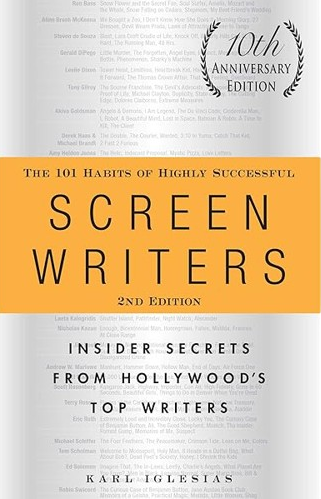“The 101 Habits of Highly Successful Screenwriters” Book Review
Review of The 101 Habits of Highly Successful Screenwriters – Insider Secrets From Hollywood’s Top Writers


How would you describe yourself as a screenwriter? Amateur? New? Emerging? Working? Successful? That last one is usually the furthest, most challenging goal to reach: Successful.
With the countless books out there promising you the lottery ticket to your successful screenwriting career, there are only a few books that tell you the truth. Whether the “lottery ticket” books are written based in an insatiable desire for money or through a more innocent aspiration of wanting to teach the public despite their own ignorance, there’s one thing you should always do before you add that book to your Amazon cart: Make sure the advice is coming from a professional working screenwriter.
Why do we recommend The 101 Habits of Highly Successful Screenwriters?
Because the entire book is filled with advice from professional working screenwriters. It’s simplistic in the fact that from cover to cover it is mainly just quotes from these writers about different topics when it comes to screenwriting. It covers everything from “Understand the Downside of Being a Screenwriter” to “Develop an Innate Sense of Drama and Conflict”.
The 101 Habits of Highly Successful Screenwriters is filled with quotes from the greats. Here’s a list of the screenwriters quoted in the book and a couple of their credits:
(In alphabetical order)
- Ron Bass (Rain Man, My Best Friend’s Wedding)
- Steven de Souza (Die Hard, Commando)
- Gerald DiPego (Message in a Bottle, The Forgotten)
- Leslie Dixon (The Thomas Crown Affair, Limitless)
- Tony Gilroy (Michael Clayton, The Bourne Identity)
- Akiva Goldsman (A Beautiful Mind, A Time to Kill)
- Derek Haas & Michael Brandt (3:10 to Yuma, Wanted)
- Amy Holden Jones (Indecent Proposal, The Resident)
- Laeta Kalogridis (Shutter Island, Alita: Battle Angel)
- Nicholas Kazan (Fallen, Bicentennial Man)
- Jim Kouf (National Treasure, Grimm)
- Andrew W. Marlowe (Air Force One, Castle)
- Bill Marsilii (Deja Vu)
- Aline Brosh McKenna (The Devil Wears Prada, 27 Dresses)
- Scott Rosenberg (Con Air, Jumanji: Welcome to the Jungle)
- Terry Rossio (Pirates of the Caribbean: The Curse of the Black Pearl, Shrek)
- Eric Roth (Forrest Gump, Dune)
- Michael Schiffer (Crimson Tide, The Four Feathers)
- Tom Schulman (Dead Poets Society, What About Bob?)
- Ed Solomon (Men in Black, Bill & Ted’s Excellent Adventure)
- Robin Swicord (The Curious Case of Benjamin Button, Memoirs of a Geisha)
If you want to be a successful screenwriter, why wouldn’t you want to learn from screenwriters with these credits?
The best part of the book is that it is organized by topics. You can take the time to read it cover to cover or seek advice in specific areas as though you have access to the screenwriter themselves.
Still not convinced? Here’s an excerpt from the book’s introduction on how it is different and what if can offer you:
“In order to write a great script, you have to be a real screenwriter because, like an aged wine, it takes time and hard work to develop the necessary craft to write great scripts…The difference between successful screenwriters and unsuccessful screenwriters is that successful screenwriters do all the things that unsuccessful ones want to do but can’t do or don’t know how to do…The focus of this book is not on how to write a formulaic script but on what it takes to become the writer who creates a unique one. In other words, on the habits and traits that increase the odds of your writing a great script — and also developing a successful career as a screenwriter.
Karl Iglesias, The 101 Habits of Highly Successful Screenwriters
I want you to take a minute to think about what he said, “The focus of this book is not on how to write a formulaic script but on what it takes to become the writer who creates a unique one.” Some success cannot be earned through simply completing the task, but only through who you become in the process.
Do you have what it takes?
Habit 59 in the book is: Understand It Takes Talent and Hard Work
Here is a small excerpt from one of the writers in this section of the book:
“Writing is incredibly hard, and most people trying to do it don’t believe this is true. They’re not working as hard as the task requires, and it shows on the pages.”
Michael Schiffer (Crimson Tide, The Four Feathers)
Do you think screenwriting is easy?
If you do, that might be because you are not putting in the work needed to take your script from good to great or even harder from great to amazing.
There is no magic formula or easy structure to become a successful screenwriter. If you have talent, that can take you far, but only if you’re willing to put in the hard work. That’s why we recommend this book. If you want to write like the best, you should learn from their habits.
You can purchase The 101 Habits of Highly Successful Screenwriters here:
If you want to know another book we highly recommend, check out this review of:
Paul has been a professional screenwriter for over 24 years and his book can help you unlearn the screenwriting “rules” that have been holding you and your creativity back.
